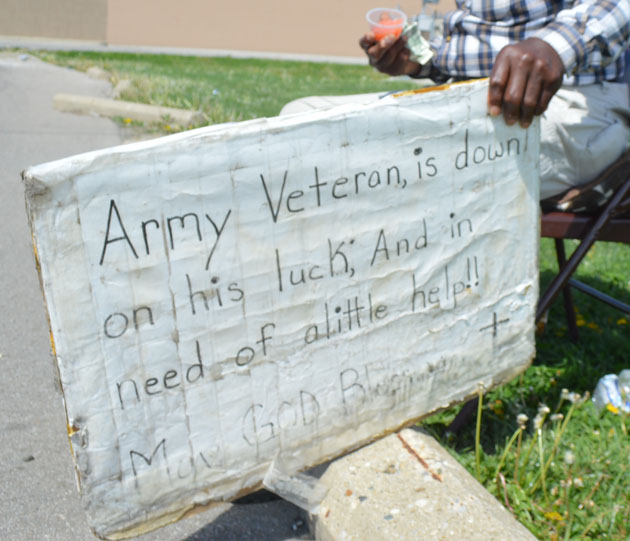After the fight
Organizations prove refuge for homeless veterans in need
Local impoverished veteran Arnell sits on a side street that leads to Walmart on April 18 holding a sign that reads, “Army Veteran, is down on his luck; And in need of a little help!! May God Bless you.” He says fighting in the military left him partially deaf and disabled, prohibiting him to stand longer than a few minutes at a time.
April 21, 2017
Arnell, who could only give us his first name, is a veteran who has been struggling to make ends meet for over 20 years after being released from service.
This veteran firing large mechanical weapons and fighting left him partially deaf and disabled, prohibiting him to stand longer than a few minutes at a time. Arnell explains his disabilities handicap him from working to earn a living.
“I can’t work,” Arnell said.
He is not alone. Just for the year 2015, there was estimated to be more than 5,000 homeless people in Indianapolis. Out of those homeless, 794 were veterans. According to the National Coalition for Homeless Veterans, 50 percent of homeless veterans in America have a serious mental illness, 51 percent have disabilities and 70 percent have a substance abuse problem, all major contributing factors to homelessness.
With some veterans experiencing hardships when they come back from the war, there are services emerging in Indianapolis to help. These places can provide shelter, amenities and support as well to veterans in need. Sources say these former military men and women fall victim to homelessness and poverty, because of the lack of support when they return from military service.
A local apartment complex, Lincoln Apartments, is helping to change that. The organization has provided quality, affordable housing for disabled veterans for four years.
The apartments hold 75 units for veterans to live and come completely furnished, including a bed and flat-screen TV, with bedding, a pillow, comforter, utensils, dishes, bath and hygienic essentials and anything else they may need.
Lincoln Apartment manager Nickola Harrell explains the apartment complex is on a tax credit program, funded by the government. Some of the veterans receive Social Security benefits, which can also contribute to funding.
Returning home should be a joyous experience, but for some veterans, that is not the case. Some return home with a mental illness known as Post-Traumatic Stress Disorder, which can involve nightmares, flashbacks and can make a veteran jumpy or easily startled. These mental illnesses can affect veterans in such a way that they may be unable to keep a job. No job means no income, which leads to poverty and often living on the streets.
Another issue for returning vets is re-acclimating to society. They are coming from a close-knit environment where they rely heavily on one another, but when they return, they no longer have their comrades to fall back on and feel they have no one to support them. This is alienation, and can be as much of a problem as PTSD.
“I believe that when they come back, they just come back kind of broken from serving our country,” Harrell said. “A lot of them don’t have a good support system for when they do come back, so that’s why a lot of them end up on the streets.”
Because the need is so great, organizations like Meals on Wheels exist to assist. According to mealsonwheelsindy.org, the free food service “innovates, educates and collaborates to end hunger and malnutrition for our senior, disabled and homebound neighbors.” This organization benefits veterans by providing them, and all clients, two meals a day.
But with proposed governmental budget cuts recently byt the Trump administration this month, Meals on Wheels will be cut off from federal funding and will in turn have to reduce the amount of help it can give.
“Meals on Wheels serves 500,000 veterans each year,” Meals on Wheels spokesperson Jenny Bertolette said to Military Times. “Any cuts to Meals on Wheels funding could cause programs to start waiting lists and cut back on the number of meals served.”
But various organizations, such as the Hoosier Veterans Assistance Foundation of Indiana, have risen up to give back and help Indiana veterans live better lives. According to their website hvafofindiana.org, the foundation “helps homeless veterans return to self-sufficiency and engages at risk veterans to prevent them from becoming homeless by providing supportive housing, case management, food, hygiene and clothing as well as other essential services.”
Marketing Coordinator Deborah Des Vignes has been working with HVAF for six and a half years, and says she got involved with HVAF because she is passionate about the cause.
“I don’t think any veteran should be homeless,” Des Vignes said. “I enjoy telling stories to try to get as much awareness for the issue.”
HVAF has fourteen different houses and apartment complexes around downtown Indianapolis and has the ability to house up to 200 veterans at a time. In the last year alone, the foundation provided more than 2,000 veterans with a place to sleep, clothes, food and hygienic necessities.
Since first being incorporated as a Far From Home chapter in 1993, HVAF has strived to “end homelessness, one veteran at a time.”
“Our veterans protected us,” Des Vignes said. “They served our country, and now it’s time for us to help them and do everything we can for them.”



